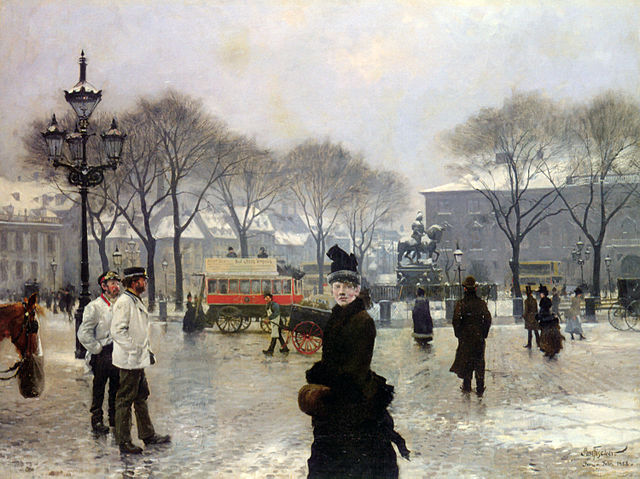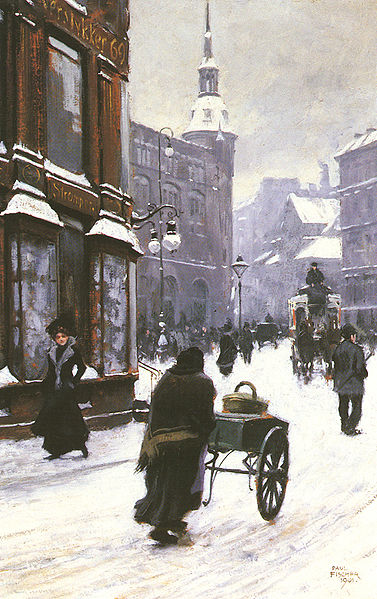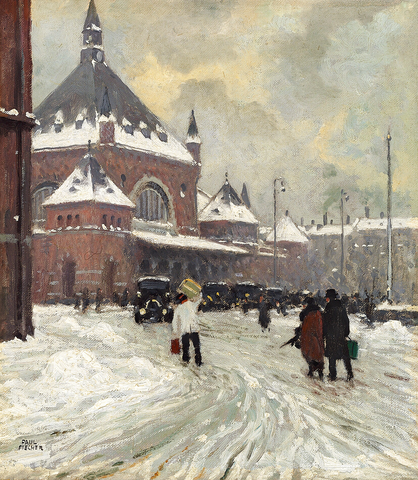
The Thammasat University Library has newly acquired a number of books by the Danish philosopher Søren Kierkegaard. These books will be shelved in the General Stacks of the Pridi Banomyong Library, Tha Prachan campus. They join several other books by and about Kierkegaard already in the TU Library collection.
In the Danish and Norwegian languages, the letter ø in the name Søren is called by the sound it represents, what has been described as sounding like the letters eu in the French word bleu. In English, it is sometimes referred to as a slashed o or o with stroke.
Kierkegaard was a theologian and social critic as well as a writer on religion, especially Christianity. He thought a great deal about morality, ethics, psychology, and the philosophy of religion. He was also concerned with the idea of love in Christianity. He was born and died in Copenhagen in the 1800s, and only lived to be 42 years old. Kierkegaard did not have a happy life, and was considered strange-looking by some people of his time. One person who attended the wedding of Kierkegaard’s brother in the 1830s described Kierkegaard as looking
almost comical. He was then twenty-three years old; he had something quite irregular in his entire form and had a strange coiffure. His hair rose almost six inches above his forehead into a tousled crest that gave him a strange, bewildered look.
Some of his most celebrated sayings include:
- It is perfectly true, as philosophers say, that life must be understood backwards. But they forget the other proposition, that it must be lived forwards.
- The function of prayer is not to influence God, but rather to change the nature of the one who prays.
- People demand freedom of speech as a compensation for the freedom of thought which they seldom use.
- Anxiety is the dizziness of freedom.
- People understand me so poorly that they don’t even understand my complaint about them not understanding me.
- Life is not a problem to be solved, but a reality to be experienced.
- There are two ways to be fooled. One is to believe what isn’t true; the other is to refuse to believe what is true.
- The most common form of despair is not being who you are.
- The greatest hazard of all, losing one’s self, can occur very quietly in the world, as if it were nothing at all. No other loss can occur so quietly; any other loss – an arm, a leg, five dollars, a wife, etc. – is sure to be noticed.
- What labels me, negates me.
- I see it all perfectly; there are two possible situations — one can either do this or that. My honest opinion and my friendly advice is this: do it or do not do it — you will regret both.
- The most painful state of being is remembering the future, particularly the one you’ll never have.
- The Bible is very easy to understand. But we Christians are a bunch of scheming swindlers. We pretend to be unable to understand it because we know very well that the minute we understand, we are obliged to act accordingly.
- Love is the expression of the one who loves, not of the one who is loved. Those who think they can love only the people they prefer do not love at all. Love discovers truths about individuals that others cannot see.
- A fire broke out backstage in a theatre. The clown came out to warn the public; they thought it was a joke and applauded. He repeated it; the acclaim was even greater. I think that’s just how the world will come to an end: to general applause from wits who believe it’s a joke.
- To dare is to lose one’s footing momentarily. Not to dare is to lose oneself.
- The tyrant dies and his rule is over, the martyr dies and his rule begins.
- Face the facts of being what you are, for that is what changes what you are.
- If anyone on the verge of action should judge himself according to the outcome, he would never begin.

Thailand and Kierkegaard
Prajñā Vihāra (or Temple of Wisdom in Sanskrit) is published twice a year by the Guna Chakra Research Center, Graduate School of Philosophy and Religion at Assumption University, Thailand.
As its website states:
Prajñā Vihāra is a multicultural, pluralistic journal of philosophy and religious studies dedicated to the promotion of mutual understanding among the peoples of the world…It welcomes specialized articles in Philosophy, Religion and Cultural Studies that seek to promote harmony between various philosophical and religious traditions while respecting cultural and religious difference. It especially welcomes those articles that exhibit how philosophical and religious ideas can play a role in solving conflict.
In 2103, Ajarn Kajornpat Tangyin of the Graduate School of Philosophy & Religion, Assumption University, published an article in Prajñā Vihāra, On the Neighbor: A Reading of Kierkegaard’s Works of Love.
Ajarn Kajornpat has also published an article about Reading Levinas on Ethical Responsibility. The TU Library owns several books by and about the French philosopher Emanuel Levinas. The abstract for On the Neighbor explains:
This essay examines the concept of the neighbor in Soren Kierkegaard’s “Works of Love”. It examines Kierkegaard’s understanding of the teaching of Christ: “You must love your neighbour as yourself”, as a commandment, and how it is connected to the love of God. It then relates this to the writings of Levinas on “the other”.

Other Presence of Kierkegaard in Thailand
In March, Thailand’s International Jazz Festival 2019 in Chiang Mai included a performance by Yasmin Kierkegaard, who performs under the stage name Yazzmin. The singer and model from Mozambique took the name Kierkegaard after moving to Denmark, possibly as a sign of recognition of the accomplishments of the noted philosopher.
Yasmin Kierkegaard speaks Danish, English, Portuguese, and Spanish. This was not her first time performing in Thailand. She wrote an account of a previous visit of four months in 2012, during which, to avoid the winter in Denmark, she accepted a job to sing at the Mandarin Oriental Bamboo Bar in Bangkok. In an article, she described her experience as beyond the ordinary. She sang 104 concerts in four months. Riding motorcycle taxis, she burned her ankle on the exhaust. As a result, she had to wear long dresses for a month. She also performed at Le Normandie Restaurant in Bangkok. Among noted Thai musicians she met was the saxophonist Koh Mr Saxman, who studied music education at Chulalongkorn University. Among other venues, Koh Mr Saxman performs at the Saxophone Pub in Bangkok.
Wider impact
Beyond the Bangkok jazz scene, in Asia Kierkegaard’s name has also been seen in Beijing, where an exhibition in his honor opened at Beijing Lu Xun Museum in 2013 to celebrate his 200th birthday. The Lu Xun Museum honors a noted Chinese writer. Lu Xun was the pen name of Zhou Shuren, an admirer of Kierkegaard’s writings. The TU Library owns several books by Lu Xun. The exhibition was opened by the Danish Cultural Institute in Beijing on June 21 with participation of the Royal Danish Embassy.

(All images courtesy of Wikimedia Commons)
